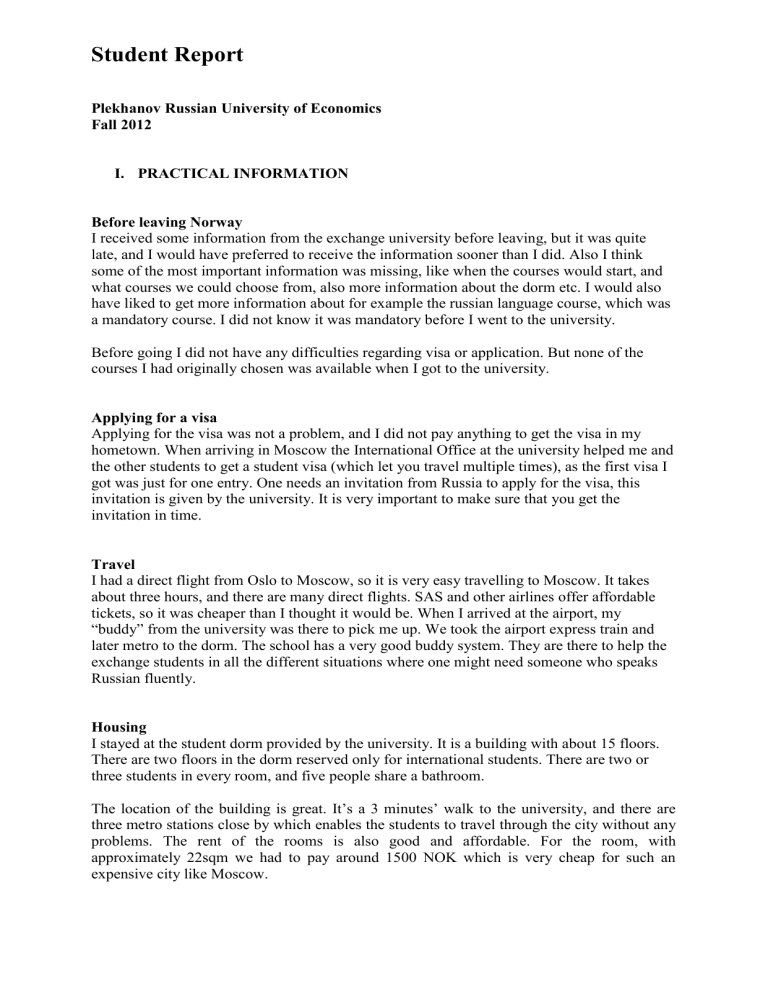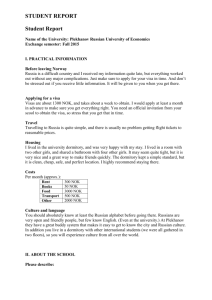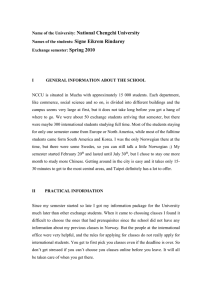Student Report

Student Report
Plekhanov Russian University of Economics
Fall 2012
I.
PRACTICAL INFORMATION
Before leaving Norway
I received some information from the exchange university before leaving, but it was quite late, and I would have preferred to receive the information sooner than I did. Also I think some of the most important information was missing, like when the courses would start, and what courses we could choose from, also more information about the dorm etc. I would also have liked to get more information about for example the russian language course, which was a mandatory course. I did not know it was mandatory before I went to the university.
Before going I did not have any difficulties regarding visa or application. But none of the courses I had originally chosen was available when I got to the university.
Applying for a visa
Applying for the visa was not a problem, and I did not pay anything to get the visa in my hometown. When arriving in Moscow the International Office at the university helped me and the other students to get a student visa (which let you travel multiple times), as the first visa I got was just for one entry. One needs an invitation from Russia to apply for the visa, this invitation is given by the university. It is very important to make sure that you get the invitation in time.
Travel
I had a direct flight from Oslo to Moscow, so it is very easy travelling to Moscow. It takes about three hours, and there are many direct flights. SAS and other airlines offer affordable tickets, so it was cheaper than I thought it would be. When I arrived at the airport, my
“buddy” from the university was there to pick me up. We took the airport express train and later metro to the dorm. The school has a very good buddy system. They are there to help the exchange students in all the different situations where one might need someone who speaks
Russian fluently.
Housing
I stayed at the student dorm provided by the university. It is a building with about 15 floors.
There are two floors in the dorm reserved only for international students. There are two or three students in every room, and five people share a bathroom.
The location of the building is great. It’s a 3 minutes’ walk to the university, and there are three metro stations close by which enables the students to travel through the city without any problems. The rent of the rooms is also good and affordable. For the room, with approximately 22sqm we had to pay around 1500 NOK which is very cheap for such an expensive city like Moscow.
Student Report
Students have to have a special card (“propusk”) to enter the dorm, this card is given to you when arriving. There are guards at the entry 24/7, and they check every person that wants to enter the dorm, and entering without the propusk is almost impossible. They also sometimes check the card when people are leaving the dorm. It is possible to have visitors till 23.00 in the evening, but the visitors must leave their passport or other documentation at the entry.
There are also several women that work on the 5 th floor (one of the “international” floors).
They are there to make sure everything is in order at the dorm, but they do not speak any english. One rule that is worth noticing, is that it is not possible to enter the dorm between
01.00 and 06.00. At first this rule was a bit difficult to understand, but after some time I appreciated this rule, as I think it would be very noisy in the night when people would arrive at many different times. One negative thing about the dorm, is that there is only one kitchen on the 5 th
floor for all the students, and this kitchen was at times very messy.
Costs
Approximately how much per month did you spend on rent, books, food, transportation, and other personal expenses?
Rent
Books
1500 NOK
200 NOK
Food 2000 NOK
Transport 200 NOK
Other ? NOK
The cost for books was low because we only needed to buy books in the Russian language course. In all the other courses the course material was provided by the teacher.
Transportation is not expensive either, but there is quite an interesting process to get a student card for the metro. It takes a long time, is very complicated, and one needs to get help from a buddy to get this card. But if one does choose not to get the student card, travelling is still not very expensive.
Culture and language
The language course at the university is very good, and you will be able to manage even if you don't have any Russian language skills before going. But, I would recommend to at lest learn the alphabet before going, that makes things easier.
The possibilities to experience the country and the culture is great. The metro system in very sophisticated and this is a very good way to travel around the city. All the metro stops are very beautiful, and the metro is so fast and efficient. A lot of the students also travelled to other places and cities in Russia, including the smaller cities around Moscow that is part of
“the Golden Ring”. Travelling by train to for example St. Petersburg is something many students do, it is a great experience, and not expensive.
Cultural and social effects from the exchange experience
Student Report
I study Arts Management at BI and to get the chance to be a student in a city like Moscow, with all the different possibilities regarding museums, galleries, music etc is really great.
Russia has such a rich cultural heritage, and I have seen so many beautiful things and had so many amazing cultural experiences. This I am very grateful for.
Now that I am done with my studies in Moscow, I can say that the time there was absolutely worth it. I met so many people, saw many nice places and had a great time experiencing the city and the culture. However, there was situations where things seemed very inefficient, and the inefficiency is noticeable in the everyday life. Some things regarding the bureaucracy in
Russia is hard to understand, and some things may seem unnecessary, but that is just something one has to accept while living in Russia.
Regarding future career opportunities I think going to Russia was a good choice. In our globalized world I think it is important to have knowledge about different cultures and being able to speak different languages. I feel really enriched as a person now that I know more about the Russian language and culture. On a general note I think it is wise to choose a quite original destination for the exchange semester, so I am happy about my choice.
II.
ABOUT THE SCHOOL
Plekhanov Russian University of Economics was established in 1907, and is the oldest institution with focus on economics in Russia's tertiary education. It is also one of the biggest universities in Russia. The university is located near the city centre of Moscow. It is a great location, and it is easy to move around the city from there. At present, the number of students at Plekhanov is over 12 000.
As an international student at Plekhanov you are a part of IBS – International Business
School. More than 80 universities from 30 countries cooperate with Plekhanov. International programs started their development in the 1990s and in 2001 it transformed into the
International Business School. At present about 350 students study at IBS, and most of the subjects at IBS are taught in English. There are both Russian and international students at
IBS.
Course registration
I was not able to register for courses before arrival, because as mentioned most of the courses
I had seen online was not available when we arrived. After the information meeting about a week after arriving students started putting together their own schedules. Every student was responsible for creating their own schedules, and could choose from all courses offered from all three years at IBS (as long as it was fall semester courses). We where given two weeks to make this schedule. It was absolutely a time demanding process, and some students were a bit frustrated, trying to solve what could seem like big a puzzle. Still after some time most students had their schedules figured out and was ready to start the semester.
Academic calendar
Arrival date: 01.09.2012
Student Report
First day of the semester:
Last day of classes:
Examination period:
10.09.2012
10.12.2012
Midterm + december, january
Any special events/holidays:
Other: End of semester:
31.01.2012
Arrival
It seemed like the administration and faculty was well-prepared for the students arrival regarding some things, and some things not. When arriving no one of the students knew when the official reception would be for example, or when the semester would officially start. We only knew we had to be in Moscow the first of september the latest. Information about when the reception of the internationals would be was given not long before the reception, and information was in general sometimes given at very short notice.
Getting information out to the students was in general very inefficient, and a lot of the most important information was given through our closed group on Facebook for international students, either by our coordinator working at the deans office, and sometimes by the Vice
Dean. The same Facebook page was used by students to post about different spare time activities. We also had a common email address for all international students that the teachers could use to send information about courses and other things. Information was also given at the deans office, and some through the university’s webpage.
The International Office
At the international office the people there was always ready to help out with any problems or answer questions. Matters regarding the international students was divided in two. Everything regarding visa, paperwork etc was taken care of by the international office, while most things regarding courses, course registration etc was taken care of by the deans office.
Promoting BI and Norway
I promoted BI by talking to the people I met about the university.
Social activities
Both the relationship among the exchange students and the relationship between the exchange students and the native students was very good. There where many different activities and gatherings hosted that the exchange students could be a part of, and also special activities for the exchange students to get to know each other. Many of the buddies also often suggested different activities.
III.
ACADEMICS
In the classroom
The lessons were thought in english. No problems.
The level of study I would describe as a bit lower in relationship to the level at BI.
The teaching was primarily theoretical.
Student Report
The professors used a combination of cases, group work and lectures. In some classes we had to do many presentations in groups.
The workload is a bit lower compared to the workload at BI, maybe mostly because the courses have for example 3 ECTS, in comparison to 7,5 at BI. And even though we had more courses than at BI, the workload still seemed a bit less.
The relationship between professors and students was mostly good. I would also say the professors have different teaching methods and not everyone was as good at giving lectures in my opinion.
The relationship between the students in the classroom was mostly good, but also sometimes very difficult because some students were very loud in the classroom, especially the students from the first year. It did not always seem like they wanted to pay much attention.
Course materials
The course materials used was mostly handouts from the teachers. Many teachers also used powerpoint presentations. The course materials was in english. The level of the course materials is not as high as at BI I would say, mostly because we used so few books. The materials was used for both detailed knowledge and a broad overview of a subject.
Exams
The exam was based on the course materials and on the lectures.
The courses was evaluated though: o Final exam (written, oral or presentation) o Mid-term exam o In-class quizzes throughout semester o Small assignments and/or papers o Presentations o Group work o Class attendance
Library and technology
The students have access to the library and its resources, but many of the students did not even know where the library was. There was also a high deposit to borrow books. To receive more information about the library in the beginning of the semester would have been good.
Description of courses
Course code & name Master/
Bachelor
Russian Language Bachelor
Exam form
3-hour written exam
Prerequisites
None
Bachelor Written exam None
Approved as
Common
Elective LAE5 Labor
Economics
HRM3 HR Bachelor 3-hour written None Elective
Management
AUD5 Auditing exam
Bachelor Two written tests
None Elective
Student Report
Doing Business in
Russia
NAE5 National
Economy
PBC1 Psychology
Bachelor Group presentation and written group project
Bachelor 3-hour written exam
Bachelor Presentation
None
None
None
Common
Elective
Elective


